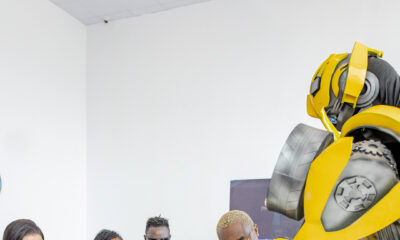Features
Talking Law with Ivie Omoregie: So, I Guess Pretty Mike Likes His Women in Chains
 A few days ago a man called “Pretty Mike” (not sure if that is what his mother calls him) decided to attend a wedding. I’m presuming he wasn’t content with his general swag getting him the desired attention, and so he decided to put some women in dog collars. These women walk several steps in front of him as he makes his grand entrance. Of course, tongues begun to wag. Social media was set ablaze and the incident made several headlines.
A few days ago a man called “Pretty Mike” (not sure if that is what his mother calls him) decided to attend a wedding. I’m presuming he wasn’t content with his general swag getting him the desired attention, and so he decided to put some women in dog collars. These women walk several steps in front of him as he makes his grand entrance. Of course, tongues begun to wag. Social media was set ablaze and the incident made several headlines.
Well it seems like the news reached the doorstep of Governor Ambode of Lagos State and a few days later, Mr Pretty, or is it Mr Mike, was picked up for violating Chapter 21 of the Criminal Code which deals with Offences Against Morality.
As you can imagine, Nigerians have come out in their masses to question the validity of this law and many have brought Bobrisky’s open conduct into the mix.
This article aims to highlight the key elements of the law and distinguish Bobrisky’s conduct from Pretty Mike’s conduct.
What does the law say?
Chapter 21 of the Criminal Code mostly deals with :-
- carnal knowledge against the order of nature (same sex sexual acts and sexual acts against animals);
- sexual contact with underage or incapacitated persons;
- persons in care of such persons, cited in (b) above, found guilty of encouraging these persons to engage in sexual acts;
- persons who attempt to have sexual contact with a woman against her will; and
- persons knowingly supporting prostitution or operating brothel like establishments.
The majority of this law is not applicable in this instance. However, Chapter 21 (231) of the Criminal Code goes further to say:
“any person who
- wilfully and without excuse does any indecent act in any public place; or
- wilfully does any indecent act in any place with intent to insult or offend any person;
is guilty of a misdemeanour and is liable to imprisonment for two years”
I believe Pretty Mike would fall into the category of such persons.
Moral obligations and citizens of the Nigerian society
Many people have described this law as vague and have questioned the rate at which it has been successfully enforced. These people have stressed that morality and indecency is a subjective matter, which often varies from individual to individual and place to place. However, I must stress that although true, there are many principals governing right and wrong behaviour which are generic and applicable to all societies. Generally, where a term is truly ambiguous the Courts will apply the reasonable man test (i.e would the reasonable man behave in such a manner if placed in the same circumstances).
An individual’s private conduct is not deemed as the concern of the government or of society at large. As Nigerian citizens, we are protected by Chapter 4 of the Nigerian Constitution which deals with Human Rights, specifically the right to privacy of all citizens and their homes. Thus, when morality is discussed it generally refers to an individual’s moral conduct as it affects the society at large. Many societies have ethical standards which, although varying from place to place, are valid and enforceable by either law, religion or social pressures.
Thus, based on this premise, as Nigerian citizens, it is established case law that we have a moral obligation to the society in which we belong to desist from conducting ourselves in a manner which might be deemed as being offensive to the people around us.
Bobrisky vs Pretty Mike
As a fallout of Pretty Mike’s conduct and his subsequent arrest, many people have exclaimed and questioned why Bobrisky has not been picked up for the same violation of Chapter 21 of the Criminal Code – Offences Against Morality. (for those who might not know, Bobrisky is heavily bleached young man who likes to dance, fixes artificial nails and wears heavy makeup)
These people are of the belief that his conduct on social media is grossly offensive and goes against the unwritten moral rules of Nigerian society.
However, here I must stress that a person’s constitutional right to freedom of expression supersedes their moral obligation to an unwritten societal rule. I know you’re probably thinking: “what about the Anti-Gay law?”; well, Bobrisky has on many occasions specifically claimed that he is not indeed gay and that his conduct on social media is purely for the pleasure of his audience and to sell his skin care products. He has emphasized that he likes wearing makeup and fixing his nails, and in many societies, this will be deemed as a way of him expressing his creativity.
To those who believe Bobrisky is gay, the onus is on you to prove it by providing evidence to support your claim.
In the case of Pretty Mike on the other hand, there is photographic and video evidence of him behaving in a manner which might be deemed by many as being highly insulative and offensive. The truth is Pretty Mike put dog collars on fellow human beings, and this act was deemed by the Lagos state Government as dehumanising. I am sure if Pretty Mike had worn the dog collar on himself I would not be addressing it right now.
Conclusion
A general rule in Public Relations is that there is no such thing as bad publicity; because of this, around the world we have seen people doing outrageous things for want of attention and social recognition. There is no question of a doubt in my mind that Pretty Mike is just trying to be sensational, in order to make his night club more popular. Bobrisky, too is trying to sell his creams. Guess what? We are all talking about both of them, so I think it worked.
On another note, whilst researching for this article I came across a clause in the Criminal Code which states
“Any person who conspires with another to induce any woman or girl, by means of false pretence or other fraudulent means, to permit any man to have carnal knowledge of her is guilty of a felony and is liable to imprisonment for three years”
It got me thinking about the various “Yoruba Demons” and the things they often do… but, abeg that’s another article.





















